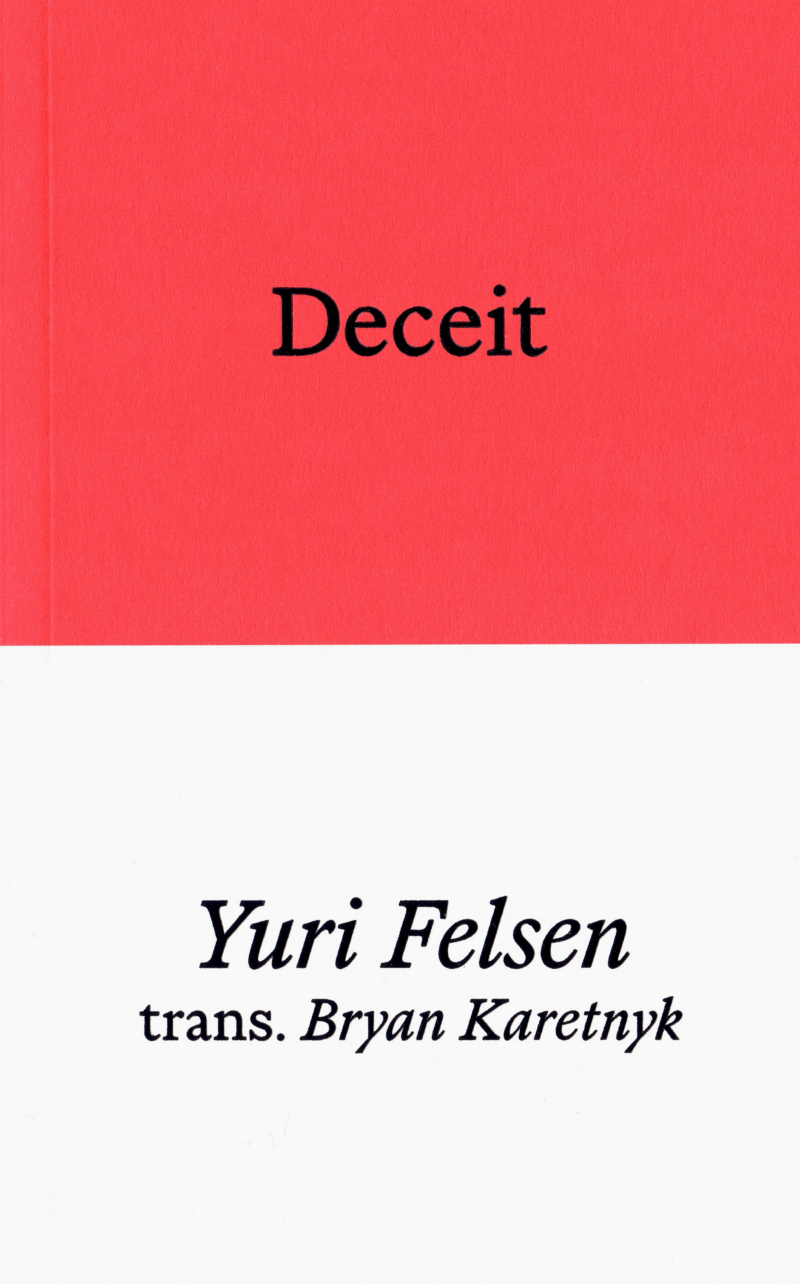Deceit
£12.00
Yuri Felsen, trans. Bryan Karetnyk
With a Foreword by Peter Pomerantsev
Appearing for the first time in English, Deceit is the debut novel by Yuri Felsen, a leading modernist writer of the interwar Russian diaspora. Known by his contemporaries as ‘the Russian Proust’, Felsen died in the gas chambers at Auschwitz, his life and legacy destroyed by the Nazis.
Written in the form of diary, Deceit is a psychological self-portrait of an unnamed narrator, a neurasthenic and aspiring author, whose often-thwarted pursuits of his love interest and muse provide the grounds for his beautifully wrought extemporizations on love, art and human nature. Modulating between the paroxysms of his tormented romance and his quest for an aesthetic mode befitting of the novel he intends to write, Deceit is a remarkable work of introspective depth and psychoanalytic inquiry.
Quite unlike any other writer in the Russian canon, Felsen evokes in rich, poetic, idiosyncratic prose not only the Zeitgeist of interwar Europe and his émigré milieu, but also its psychology and the existential crisis of the age. What Nabokov achieves with images and the physical world, Felsen does with the emotional and metaphysical.
‘This is … real literature, pure and honest’ – Vladimir Nabokov
‘He [Felsen] has rightly been compared to Proust in his determination to make language capture every atom of the mind’s workings… This translation is a formidable achievement.’ – Literary Review
‘Felsen’s name deserves to be conjured with, just as it was before Paris fell.’ – The Sunday Telegraph
‘Yuri Felsen’s Deceit offers the reader that rarest of gifts: a glimpse into consciousness as it was constructed nearly a hundred years ago; a portrait not only of how one Russian émigré lived in Paris in the first half of the Twentieth Century but of what and how he thought. This is an improbably modern novel in which, to my own surprise, I seemed, again and again, to encounter and recognize myself.’ – Miranda Popkey, author of Topics of Conversation
‘As astute as it is disturbed, as callow as it is wise, and as brilliant as it is idiosyncratic, Deceit reads like the twisted love child of Proust and Dostoevsky, but with a genius all its own.’ – Antoine Wilson, author of Mouth to Mouth and Panorama City
Kindle Edition available here.
Description
Appearing for the first time in English, Deceit is the debut novel by Yuri Felsen, a leading modernist writer of the interwar Russian diaspora. Known by his contemporaries as ‘the Russian Proust’, Felsen died in the gas chambers at Auschwitz, his life and legacy destroyed by the Nazis.
Written in the form of diary, Deceit is a psychological self-portrait of an unnamed narrator, a neurasthenic and aspiring author, whose often-thwarted pursuits of his love interest and muse provide the grounds for his beautifully wrought extemporizations on love, art and human nature. Modulating between the paroxysms of his tormented romance and his quest for an aesthetic mode befitting of the novel he intends to write, Deceit is a remarkable work of introspective depth and psychoanalytic inquiry.
Like voyeurs, party to his most intimate thoughts, we accompany the diarist as he goes about Paris, making enraptured preparations for the materialisation of his fantasy, observing not only his eagerness, dreaminess and poetic inclinations, but also his compulsive desire to analyse his surroundings and self. Yet amid these ravishing flights of scrutiny we discern hints of his monomaniacal tendencies, which blind him from the true nature of his circumstances. Thus begins an exquisite game arranged by the author, wherein it falls to the reader to second-guess the essence of what really lies behind his narrative.
With a Foreword by Peter Pomerantsev and an Afterword by Bryan Karetnyk
‘The miracle of Yuri Felsen is how his apparently Nabokovian rhythms lull you into a false sense of security, before a sudden and chilling exposure to the weather of a walk where the whole elegantly interwoven conceit of the narrator is ripped apart. And the pain of someone like Walser glints through a decadent surface of exiled life in Paris, to hint at darker shadows to come.’ – Iain Sinclair
‘Towards the end of this strange novel in the form of a strange diary the narrator declares that “it is impossible to live without deceit”. What has preceded this bald statement is the work of a connoisseur of deceit in its multitudinous forms, the most potent being a subset of self deceptions described in painful raw detail. It’s a work steeped in absolutely joyous misery.’ – Jonathan Meades
‘Dark thickets of language part to reveal a pearl of psychological prose and a highly actual account of the psychic impermanence of migration.’ – Sasha Dugdale
‘Deceit is a strange and beautiful dream, an intimate and tragic love letter from a lost world.’ – Camilla Grudova
Yuri Felsen was the pseudonym of Nikolai Freudenstein. Born in St Petersburg in 1894, he emigrated in the wake of the Russian Revolution, first to Riga and then to Berlin, before finally settling in Paris in 1923. In France, he became one of the leading writers of his generation, alongside the likes of Vladimir Nabokov; influenced by the great modernists such as Marcel Proust, James Joyce and Virginia Woolf, his writing stood at the forefront of aesthetic and philosophical currents in European literature. Following the German occupation of France at the height of his career, Felsen tried to escape to Switzerland; however, he was caught, arrested and interned in Drancy concentration camp. He was deported in 1943 and killed in the gas chambers at Auschwitz.
Bryan Karetnyk is a British writer and translator. His recent translations include major works by Gaito Gazdanov, Irina Odoevtseva and Boris Poplavsky. He is also the editor of the landmark Penguin Classics anthology Russian Émigré Short Stories from Bunin to Yanovsky.
Read a sample:
Deceit_website sample



